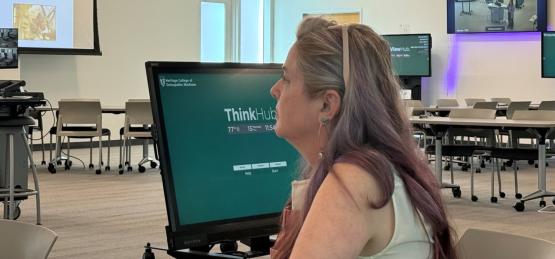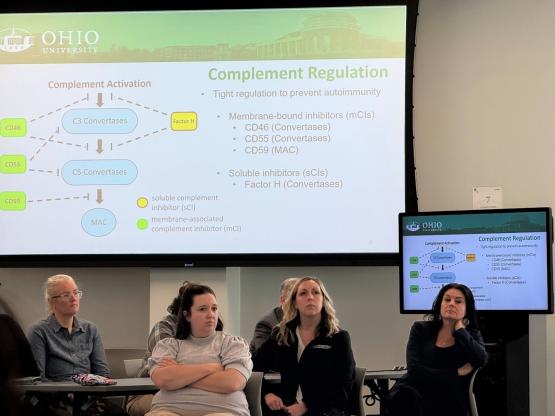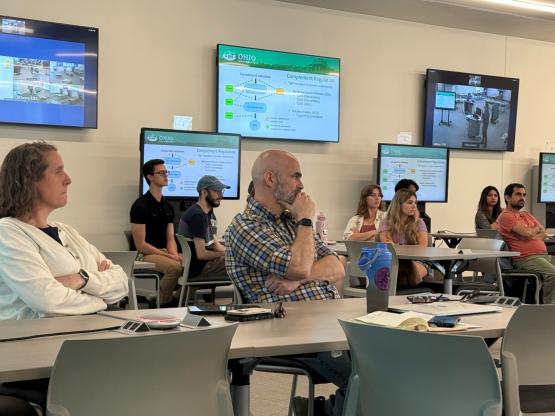
New name, broader mandate: ITDI expands focus with renaming of key initiative

The Infectious and Tropical Disease Institute (ITDI) at Ohio University is expanding the scope of one of its core research programs, rebranding the former Bacterial Pathogenesis initiative to Microbial Pathogenesis.
The new name reflects a broader scientific mandate that now includes virology alongside existing bacteriology work.
The change, announced on Thursday, on May 15, 2025, during a brief on-campus ceremony, signals a strategic shift in research priorities and a more integrative approach to infectious disease science.
“This change reflects both the growth of our current members and our future plans to integrate virology in a more formal way, as well as encompassing the research areas adjacent to and complementing infectious disease research ” Interim Director of Operations Kat Marriott said.
The renaming comes as part of a larger restructuring of ITDI’s three major research initiatives—Tropical Disease, Microbial Pathogenesis, and Reproductive and Sexual Health. While these pillars have long guided the institute’s work, leaders now see an urgent need for broader collaboration and interdisciplinary integration.
Marriott underscored that the new Microbial Pathogenesis framework better captures the variety of research currently underway, while also preparing the institute to meet emerging global health challenges.

Virology at the forefront
Virology is seen as central to this new direction for global health challenges.
Maryam Ahmed, professor and chair of Biological Sciences in the College of Arts and Sciences, stressed the importance of the field’s potential to catalyze innovation and draw together expertise from across disciplines.
“Virologists work across a broad spectrum of fields and with organizations ranging from local health agencies to global nonprofits, pharmaceutical firms and environmental scientists,” Ahmed said. “Therefore, investment and recruitment in this area will enhance the breadth of research conducted at Ohio University to address current global health concerns.”
Ahmed, whose research investigates how viruses evade the immune system and how natural products can lead to antiviral strategies, also sees the virology expansion as an opportunity to strengthen vaccine development and drug discovery efforts.
“Building collaborations with faculty in the areas of immunology and drug discovery has the potential to enrich my research goals,” she said.

Faculty embrace a collaborative vision
Assistant Professor Shaohua Wang of the Heritage College of Osteopathic Medicine and ITDI investigator, underscored the importance of the rebranding in strengthening Ohio University’s scientific reach.
“It opens doors for novel research directions and partnerships, both locally and globally,” she said. “Expanding ITDI’s research scope will attract top researchers and students interested in microbiology, virology and therapeutic innovation.”
For many ITDI researchers, the change also reflects a deepening commitment to cross-campus collaboration. Ronan K. Carroll, associate director of ITDI and assistant professor of microbiology, called collaboration “absolutely essential in today’s research landscape.”
He pointed to a wide range of high-impact projects emerging from partnerships within his lab, including work with NASA that sent bacterial samples to the International Space Station to study the effects of zero gravity on microbial behavior.
“These experiences show how far-reaching your research can become when you invest in collaboration,” Carroll said. “That’s where I see the Infectious and Tropical Disease Institute playing a crucial role; it creates opportunities for those of us at Ohio University to build strong working relationships closer to home.”
He noted that two of his ITDI colleagues present at the announcement were also co-authors on NIH-funded research projects.
“That’s exactly what we want ITDI to offer, a collaborative 'sandbox' where researchers with shared interests can come together, exchange ideas and identify ways to work more closely,” he said.

Nathan Weyand, assistant professor of biological sciences and ITDI faculty member, echoed the sentiment.
“Having people around you who are interested in similar topics, yet come at them from slightly different perspectives, is incredibly valuable,” he said. “It not only fosters innovation but also creates a space where we can challenge each other, which is at the heart of good science.”
The spirit, as well as the mechanics, of fostering collaboration is also evident in the connection of ITDI with the other institutes at Ohio University. Darlene Berryman, associate dean of research and innovation in Heritage College, described the movement and impetus behind keeping the institutes connected, the sharing of intellectual ideas and the possibilities of collaboration.
Local roots, global reach
In parallel with the rebranding, ITDI has launched the Infectious Diseases in Appalachian Ohio (IDAO) Initiative, a community-based effort to address regional health disparities. By collaborating with public health partners across southeastern Ohio, the initiative aims to confront infectious disease threats using locally grounded, evidence-based strategies.
With a new name and an expanded mission, ITDI’s leadership hopes to position the institute as a driver of scientific innovation from Appalachian communities to outer space.
